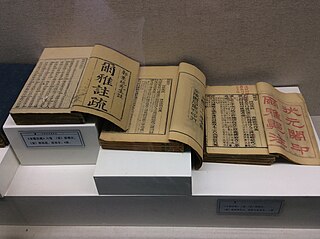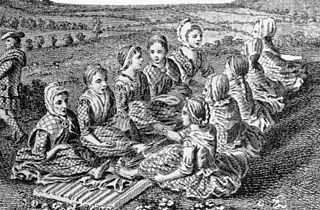
A dictionary is a listing of lexemes from the lexicon of one or more specific languages, often arranged alphabetically, which may include information on definitions, usage, etymologies, pronunciations, translation, etc. It is a lexicographical reference that shows inter-relationships among the data.
Lexicography is the study of lexicons, and is divided into two separate academic disciplines. It is the art of compiling dictionaries.
Lexicology is the branch of linguistics that analyzes the lexicon of a specific language. A word is the smallest meaningful unit of a language that can stand on its own, and is made up of small components called morphemes and even smaller elements known as phonemes, or distinguishing sounds. Lexicology examines every feature of a word – including formation, spelling, origin, usage, and definition.

A circular definition is a type of definition that uses the term(s) being defined as part of the description or assumes that the term(s) being described are already known. There are several kinds of circular definition, and several ways of characterising the term: pragmatic, lexicographic and linguistic. Circular definitions are related to Circular reasoning in that they both involve a self-referential approach.
Terminology is a group of specialized words and respective meanings in a particular field, and also the study of such terms and their use; the latter meaning is also known as terminology science. A term is a word, compound word, or multi-word expressions that in specific contexts is given specific meanings—these may deviate from the meanings the same words have in other contexts and in everyday language. Terminology is a discipline that studies, among other things, the development of such terms and their interrelationships within a specialized domain. Terminology differs from lexicography, as it involves the study of concepts, conceptual systems and their labels (terms), whereas lexicography studies words and their meanings.
In mathematics, the lexicographic or lexicographical order is a generalization of the alphabetical order of the dictionaries to sequences of ordered symbols or, more generally, of elements of a totally ordered set.
Sandro Nielsen is a Danish metalexicographer, Associate Professor at Centre for Lexicography at the Aarhus School of Business, Denmark, from where he received his PhD in 1992. Nielsen has contributed to lexicography as a theoretical and practical lexicographer with particular reference to bilingual and multilingual specialised dictionaries. He is the author and co-author of more than one hundred publications on lexicography, theoretical papers, printed and electronic (online) dictionaries.
In the broadest sense of the word, a vocable is any meaningful, identifiable utterance or writing, such as a word or term, that is fixed by their language and culture. The use of the term for words in the broad sense is archaic and the term is instead used for utterances which are not considered words, such as the English vocables of assent and denial, uh-huh and uh-uh, or the vocable of error, uh-oh.
Haran or Aran is a man in the Book of Genesis in the Hebrew Bible. He died in Ur of the Chaldees, was a son of Terah, and brother of Abraham. Through his son Lot, Haran was the ancestor of the Moabites and Ammonites.

The Erya or Erh-ya is the first surviving Chinese dictionary. The sinologist Bernhard Karlgren concluded that "the major part of its glosses must reasonably date from the 3rd century BC."
In linguistics, phraseology is the study of set or fixed expressions, such as idioms, phrasal verbs, and other types of multi-word lexical units, in which the component parts of the expression take on a meaning more specific than, or otherwise not predictable from, the sum of their meanings when used independently. For example, ‘Dutch auction’ is composed of the words Dutch ‘of or pertaining to the Netherlands’ and auction ‘a public sale in which goods are sold to the highest bidder’, but its meaning is not ‘a sale in the Netherlands where goods are sold to the highest bidder’; instead, the phrase has a conventionalized meaning referring to any auction where, instead of rising, the prices fall.
Puirt à beul is a traditional form of song native to Scotland that sets Gaelic lyrics to instrumental tune melodies. Historically, they were used to accompany dancing in the absence of instruments and to transmit instrumental tunes orally.

Waulking songs are Scottish folk songs, traditionally sung in the Gaelic language by women while fulling (waulking) cloth. This practice involved a group of women, who traditionally prepared cloth, rhythmically beating newly woven tweed or tartan cloth against a table or similar surface to lightly felt it and shrink it to better repel water. Simple, beat-driven songs were used to accompany the work.
Beryl T. "Sue" Atkins was a British lexicographer, specialising in computational lexicography, who pioneered the creation of bilingual dictionaries from corpus data.
Patrick Wyndham Hanks was an English lexicographer, corpus linguist, and onomastician. He edited dictionaries of general language, as well as dictionaries of personal names.

The Miroslav Krleža Institute of Lexicography is Croatia's national lexicographical institution. Based in Zagreb, it was originally established in 1950 as the national lexicographical institute of the Socialist Federal Republic of Yugoslavia. It was renamed after its founder, the Croatian writer Miroslav Krleža, in 1983.
Non-lexical vocables, which may be mixed with meaningful text, are a form of nonsense syllable used in a wide variety of music. Common English examples are "la la la", "na na na" and "da da da".
Contrastive linguistics is a practice-oriented linguistic approach that seeks to describe the differences and similarities between a pair of languages.
An explanatory combinatorial dictionary (ECD) is a type of monolingual dictionary designed to be part of a meaning-text linguistic model of a natural language. It is intended to be a complete record of the lexicon of a given language. As such, it identifies and describes, in separate entries, each of the language's lexemes and phrasemes. Among other things, each entry contains (1) a definition that incorporates a lexeme's semantic actants (2) complete information on lexical co-occurrence ; (3) an extensive set of examples. The ECD is a production dictionary — that is, it aims to provide all the information needed for a foreign learner or automaton to produce perfectly formed utterances of the language. Since the lexemes and phrasemes of a natural language number in the hundreds of thousands, a complete ECD, in paper form, would occupy the space of a large encyclopaedia. Such a work has yet to be achieved; while ECDs of Russian and French have been published, each describes less than one percent of the vocabulary of the respective languages.
Dicționarul Limbii Române, abbreviated DLR, also called Thesaurus Dictionary of the Romanian Language, is the most important lexicographical work of the Romanian language, developed under the aegis of the Romanian Academy during more than a century. It was compiled and edited in two stages, in 37 volumes and contains about 175,000 words and variations, with more than 1,300,000 quotes. The development of electronic version was made in 2007–2010.





